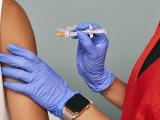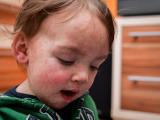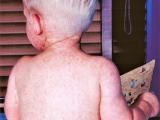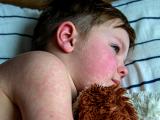Jun 9, 2011
Reassortant pandemic H1N1–seasonal H3N2 virus found in toddler
Ontario health officials have identified a reassortant pandemic H1N1–seasonal H3N2 influenza virus collected from an infected toddler, according to a ProMED-mail report today. The hybrid virus was recovered from a 16-month-old boy in a Toronto-area hospital who had respiratory and gastrointestinal symptoms but was discharged within 15 hours and recovered uneventfully. Genetic sequencing identified genes of both pandemic 2009 H1N1 and seasonal H3N2 viruses. An accompanying commentary by ProMED moderator Craig Pringle, virologist and professor emeritus of the UK's University of Warwick, stated, "The occurrence of coinfection is not surprising, but this appears to be the 1st demonstration of in vivo reassortment. Fortunately the infected child has recovered and the recombinant (reassortant) virus was not transmitted. It remains to be seen whether this or similar reassortants will appear in subsequent epidemics."
ProMED-mail is a service of the International Society for Infectious Diseases.
Jun 9 ProMED-mail post
Study: H1N1 left surprisingly wide footprint in Scotland
A serologic survey by Scottish researchers suggests that more than a third of Scotland's population had been infected with the 2009 H1N1 pandemic flu virus by Mar 1, 2010, indicating the virus was much more widespread than previously believed. Writing in PLoS One, the researchers report that they obtained serum samples from a representative sample of 1,563 adults between late October 2009 and April 2010. On the basis of a microneutralization assay, they estimated that 44% of adults had antibodies to the virus by Mar 1, 2010. After correcting for cross-reactivity and for reported H1N1 vaccination rates, they estimated that 34% of adults had been infected with the pandemic virus by Mar 1. But because of imperfect test sensitivity, the real number could be over 40%, they said. As seen in most studies of the pandemic, the rate of infection was higher for young adults than older ones. According to a press release from the
University of Edinburgh, only about 100,000 people in Scotland consulted their physician regarding flu, out of bout 2 million who are believed to have contracted the virus. People living in the most deprived areas were twice as likely to have been infected, according to the release. The authors said it is possible that many people who were vaccinated against the virus were already immune.
Jun 8 PLoS One report
Jun 8 University of Edinburgh news release
Flu season starting in South Africa but not Australia or New Zealand
A recent increase in cases has announced the start of the influenza season in South Africa, but the season has not yet begun in Australia and New Zealand, the World Health Organization (WHO) said in a recent flu surveillance update. South Africa's National Institute for Communicable Disease Detection has reported an increase in flu detections over the past 4 to 5 weeks, with about 45 specimens testing positive in week 20. Most of the isolates have been 2009 H1N1 viruses, but a few have been H3N2, the WHO reported. Australia had previously reported an unusual out-of-season uptick in flu cases, but the numbers have recently declined, and levels of influenza-like illness (ILI) have remained low in most parts of the country, the WHO said. Meanwhile, New Zealand has reported scattered ILI cases, but weekly doctor visits for ILI have remained below the baseline. With the 2010-11 season in the rearview mirror, only sporadic
flu cases have been reported recently in temperate parts of the Northern Hemisphere. Tropical regions have reported very little flu activity recently, the WHO said.
Jun 3 WHO flu update
Medicago's plant-based VLP vaccine tests well in phase 1 trial
Medicago, of Quebec City, reported yesterday that a phase 1 clinical trial showed its plant-based virus-like particle seasonal influenza vaccine to be safe and immunogenic in adults. In the study, 100 volunteers aged 18 to 49 were given a placebo or the VLP vaccine in doses of 5, 13, or 28 micrograms (mcg), the company said in a press release. In the 5-mcg group, 61% of volunteers had a fourfold increase in hemagglutinin inhibition (HI) titers, which qualified for seroconversion, and 83% had HI titers greater than 1:40, which gave them seroprotection. The press release did not specify these rates in the higher-dosage groups but said that 98% of all volunteers "developed an immune response." Medicago President and CEO Andy Sheldon said in the release, "These positive clinical trial results are an important milestone as they continue to demonstrate that our rapid plant-based vaccine technology is both safe and effective."
Jun
8 Medicago press release
New measles cases confirmed in Maryland, California, New York
Officials in Maryland, California, and New York City are reporting new measles cases and saying that others may have been exposed to the disease. The Maryland Department of Health and Mental Hygiene (MDHMH) yesterday announced the state's first case since 2009 but did not specify the person's age or sex. In a release, the agency said the person may have exposed others to the disease at grocery and liquor stores in Catonsville on May 31, a Catonsville High School graduation on Jun 1, a restaurant in Easton on Jun 2, and Oriole Park at Camden Yards and MTA Light Rail on Jun 3. But it said the risk of transmission in large outdoor settings like Camden Yards is very low.
Jun 8 MDHMH press release
Meanwhile Humboldt County officials on the far northern coast of California have reported their first measles case in more than a decade, in a 22-year-old woman who
visited China in May, according to the Times-Standard, a county newspaper. Health officials warned that other may have been exposed to the disease, as the woman visited an area restaurant the day after her May 19 return from China and worked in a separate restaurant on May 23 and 24.
And in New York City, health officials said three more measles cases have been confirmed, raising the case count since January to 13, according to a CBS News report yesterday. The cases involved two adults and an 8-month-old, none of whom had traveled abroad, which means the virus is spreading locally, officials said. The city health department urged doctors to be on the lookout for more cases, the story said.
Jun 8 CBS News report
Fatal pneumonia case points up hot-tub risks
A recent case of a previously healthy woman who died of pneumonia that probably resulted from bathing in a hot tub points up the health risks posed by poor maintenance of hot tubs, according to a report in Infection. The woman, a 49-year-old German, had symptoms of pneumonia and presented at an emergency room 2 days after returning home from a stay at a wellness hotel in Austria. Pseudomonas aeruginosa was found in her blood and respiratory specimens, and she died after 9 days of hospitalization, despite adequate antibiotic treatment. Investigators took water samples from the hotel facilities used by the patient and found 37,000 colony-forming units of P aeruginosa per milliliter in a sample from the hot tub. Further tests showed that the bacteria from the water sample and from the patient's specimens were closely related. "The detection of P aeruginosa in high numbers in a hot tub indicates massive biofilm
formation in the bath circulation and severe deficiencies in hygienic maintenance," the report says. "The increasing popularity of hot tubs in hotels and private homes demands increased awareness about potential health risks associated with deficient hygienic maintenance." The authors comment that severe, community-acquired P aeruginosa infections in previously healthy people are rare but are often fatal when they do occur.
Infection abstract




















